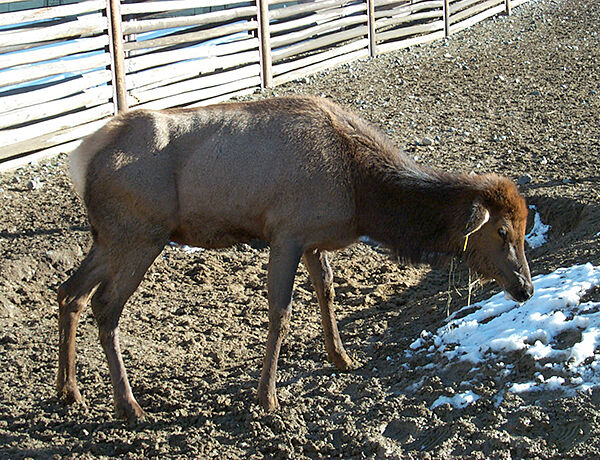State continues surveillance for chronic wasting disease
Published 11:00 am Saturday, September 16, 2023

- An elk with late-stage Chronic Wasting Disease showing typical symptoms (drooling, carrying head low, exaggerated wide posture). In most cases, it is difficult to determine if an animal has CWD until it is tested because the disease takes months to several years to cause clinical symptoms and eventual death.
SALEM — Oregon wildlife officials urge big game hunters who tag a deer or elk early in the main rifle seasons this fall to stop by one of the Oregon Department of Fish and Wildlife’s (ODFW) Chronic Wasting Disease (CWD) check stations.
ODFW staff will be sampling animals for this deadly disease detected in 2021 in two mule deer in Idaho within 30 miles of the Oregon border.
There will be two stations in Northeastern Oregon:
• Elgin Rodeo Grounds, 790 S. Eighth Ave. It will be open during the opening weekend of deer season, Oct. 7-9, from 10 a.m. to 6 p.m., and the opening weekend of elk season, Nov. 4-6, from 10 a.m. to 5 p.m.
• Baker City, ODOT parking lot off Highway 86 near Exit 302. It will be open during the same days and hours as the Elgin station.
Hunters can also contact their local ODFW office to arrange for district staff to get a sample or ask their meat processor or taxidermist. Find a list of participating ODFW offices and businesses at myodfw.com/articles/other-ways-get-your-animal-tested-cwd.
For the second straight year, hunters transporting deer, elk or other wildlife parts who encounter a CWD check station are required, under a 2021 law, to stop to have their animal sampled. Hunters or vehicles that are not transporting wildlife carcasses or parts do not need to stop. Hunters are not required to go out of their way to drive by a check station, though ODFW encourages every hunter transporting a deer or elk to stop by if they are in the area.
When hunting out of state, remember it’s illegal to bring the brain and/or spinal column of a harvested animal back with you into Oregon. These are body parts known to harbor the disease.
Test results are expected to take up to a month. If an animal ever tests positive for CWD, a biologist or veterinarian will phone the hunter directly. Negative test results will be posted by ODFW ID number for hunters to individually check online at https://www.dfw.state.or.us/wildlife/health_program/CWD-testing/
Surveillance for CWD
ODFW has sampled more than 28,000 deer and elk for CWD over the past 20 years, including animals killed by hunters or by vehicles, as the disease began to spread from Colorado and Wyoming to other states due to animal migrations and movements of live animals and carcasses by people. Oregon’s surveillance effort has not detected CWD in free-ranging deer, elk or moose within the state. But it was found in mule deer, Rocky Mountain elk and white-tailed deer in Idaho, 30 miles from the Oregon border, late in 2021.
“With the disease detected in multiple species so close to Oregon, we are concerned it could already be here,” said Dr. Colin Gillin, ODFW state wildlife veterinarian. “That’s why we are asking successful hunters to please get their animal tested this year.
“There is no cure, no treatment, or vaccine for the disease and it is fatal to all animals that become infected,” Gillin said. “But if we catch it early, we will have the best chance of minimizing its spread and impact on Oregon’s big game herds.”
Once an animal is infected, it can take several years for symptoms to appear, so in most cases deer and elk that test positive for the disease will appear normal and healthy. That’s why ODFW tests as many animals as it can, including both hunter-harvested and roadkilled deer and elk. Oregon’s captive elk facilities are also assisting in the state’s surveillance by testing all of their captive animals that die beyond the age of 6 months.
Deer, elk urine products banned
The use of products containing commercial deer or elk urine (scent lures) has been banned in Oregon as part of efforts across North America to reduce the risk of spreading CWD.
In 2019, Oregon State Legislature passed HB 2294, banning all commercially produced deer and elk urine scents that contain or are derived from any cervid urine to reduce the threat of CWD.
Hunters or businesses who have these products should safely dispose of them by bringing them to an ODFW district office. ODFW staff will arrange for any scent products collected to be incinerated in an 1,800-degree oven, a temperature known to kill the prion that causes CWD.
“It’s important that these products are not poured down a drain or on the ground when they are discarded,” Gillin said. “We want to limit the CWD prion that causes the disease from being deposited on the landscape.”
ODFW offices participating include:
• Baker City, 2995 Hughes Lane, 541-523-5832.
• Enterprise, 65495 Alder Slope Road, 541-426-3279.
• Canyon City, 305 N. Canyon City Blvd., 541-575-1167.
• La Grande, 107 20th St., 541-963-2138.
• Ontario, 3814 Clark Blvd., 541-889-6975.
• Pendleton, 73471 Mytinger Lane, 541-276-2344.
What is CWD and can humans get it?
Chronic Wasting Disease affects members of the cervid family such as deer, elk and moose. It is an always fatal, infectious disease caused by a protein called a prion. It is spread by nose-to-nose contact between animals and through urine, feces, blood and saliva. The more animals are congregated, the easier it is for CWD to pass from one animal to another, which is why baiting and feeding deer and elk is a risky practice and discouraged to prevent disease spread.
The prions are shed in feces and urine by live, infected animals or in the carcasses of animals that died infected with the disease. Prions can also persist in soil for years, potentially infecting other animals into the future. Many states, including Oregon, ban the import of certain animal parts, such as brain and spinal column, from other states (see Parts Ban for more info). This regulation limits the chance that infected brain or spinal column will be discarded on the landscape to potentially infect an Oregon animal.
Infected animals can spread the disease for several years before showing symptoms (which include loss of balance, drooling, emaciation or wasting). So, testing apparently healthy deer and elk early in the course of the disease when they are not showing symptoms is the most effective method to catch the disease before an animal has spread the disease across the landscape and to other animals.
There is no evidence that humans can contract CWD from eating or handling meat from an animal infected with the disease. However, humans are susceptible to other similar diseases such as mad cow disease from the cattle form of this prion disease and Creutzfeldt-Jakob disease (CJD), which is a naturally occurring human-form of a similar prion disease. The Centers for Disease Control (CDC) recommends caution and provides information on preventative steps hunters can take to be as safe as possible
For more information on CWD visit https://myodfw.com/CWD





